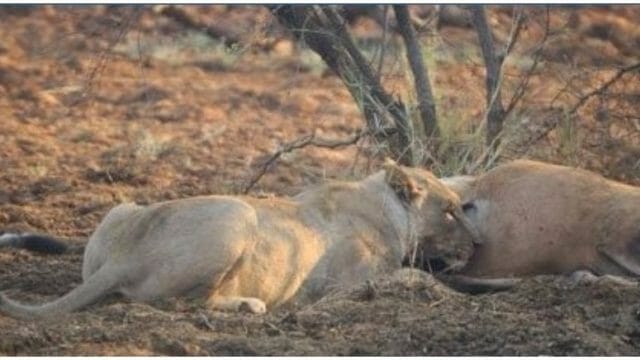They say what sets us apart from the animal kingdom is our self-awareness — that deeply rooted consciousness that defines our human experience.
Yet time and time again, nature reminds us that empathy is not exclusive to humans. Animals, too, have shown acts of tenderness, of emotion, and of unexpected compassion — sometimes in ways that leave us breathless.
But nothing prepared me for this.
In the wild, roles are clear. Some animals hunt. Others are hunted. And among the fiercest of them all is the lion — a symbol of strength and dominance, a creature reigning at the apex of the food chain. It’s easy to see them as ruthless, governed solely by instinct.
But an astonishing scene that unfolded in South Africa’s Madikwe Game Reserve has turned that idea on its head.
A group of safari-goers, led by guide Gerry Van Der Walt, came across a lioness who had just completed a successful hunt. Her target had been a fully grown antelope — a tough but necessary kill for a predator ensuring her survival.
However, what followed defied every expectation.
As the lioness began to feed, something caused her to abruptly stop. She paused, her focus shifting. Inside the belly of her prey, she discovered something fragile and heartbreaking — an unborn calf.
Rather than continue eating, the lioness stepped back. What happened next was something no one in the group could have anticipated.
“She stopped. Just like that,” Gerry recounted. “Instead of continuing with her meal, she carefully removed the fetus. Then she placed it on the ground — delicately, almost reverently.”
She circled the tiny body, as though trying to determine if there was any chance it might still draw breath. Her movements slowed, her demeanor shifted. Gone was the ferocious predator — in her place stood a creature visibly stirred, uncertain, almost grieving.
“I’ve seen pregnant prey taken down before,” Gerry explained. “Normally, lions don’t react. They just eat. But this time was… different.”
The lioness nudged the lifeless fetus gently, her nose brushing against its body. Then, in an eerily maternal gesture, she lifted it by the neck — the way she might carry one of her own cubs.
When it became clear that the unborn calf had not survived, the lioness didn’t return to her meal. Instead, she walked into a patch of grass, found a concealed spot among the foliage, and placed the tiny body there — as if laying it to rest.
And she stayed.
“She lingered beside it,” Gerry said softly, “gently nudging it one last time. Her eyes scanned the horizon, watchful, tense — not with hunger or fear, but as though waiting… for something. Or someone.”
She didn’t eat again. She didn’t even touch the rest of the carcass. Instead, she lay beside it, her body language speaking volumes — sorrow, reflection, possibly even remorse.
“I’ve seen many things in the wild,” Gerry reflected, “but never something quite like this. It felt like we were witnessing more than behavior. It felt like we were witnessing emotion.”
And how can one argue otherwise?
Nature is raw, unfiltered. It operates on instinct, survival, and necessity. But this lioness — in that moment — showed something deeper. She showed restraint. She showed mourning. She showed what looked very much like a sense of guilt.
She reminded us that animals, in their own ways, are capable of so much more than we often give them credit for. That perhaps the line between human and beast isn’t drawn quite so clearly.
If this lioness can pause her survival to mourn the unborn life of her prey, then surely we must acknowledge: animals feel. They grieve. They care.
And they continue to astonish us.
If this story moved you, don’t keep it to yourself — let others feel the awe of this rare and beautiful moment in the wild.
